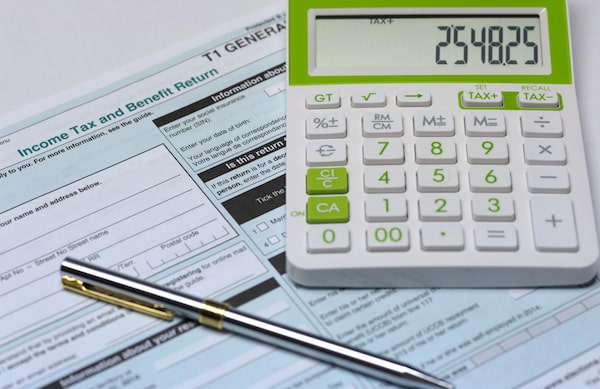
A Canadian T1 general income tax form with a financial calculator and pen.iStockPhoto / Getty Images
Jeremy is a young man in his twenties who’s a neighbour and living with his parents. He’s not working at the moment, but he told me the other day he had a promising interview. “They asked me what my biggest weakness was. I told them that I don’t know when to quit. So, they said I was hired. But the job was really hard, so I quit.”
Once Jeremy does find a job he can stick with, he’ll learn that it’s also hard for employees to get much in the way of tax deductions. Still, there are things they can do before year-end to save tax. Let’s look at the top 10 strategies.
1. Pay for courses before year-end. You’ll be able to claim the Canada training credit in 2024 if you pay for eligible postsecondary courses or fees for an occupational, trade or professional exam taken in the year. If you’re at least 26 and younger than 66 at the end of the year and have a Canada training credit limit (shown on your last notice of assessment), you can qualify for a cumulative $250 each year, up to $5,000 in your lifetime.
2. Claim home office expenses. If you’ve worked from home more than half the time this year then you can qualify to claim a deduction for home office expenses. If you’re short of the “half-the-time” test, consider working from home more before year-end to qualify if you can. Your employer will need to sign Form T2200 to verify your work-from-home arrangement.
3. Pay moving expenses. If you moved, or plan to move, to be closer to work, then your moving costs may be deductible if your new home is at least 40 kilometres closer to your new work location. Also, you’ll generally face tax in the province in which you reside on Dec. 31. So, if you’re moving to a higher-taxed province, delaying that move until January might save you tax (or moving before year-end can make sense if you’re moving to a lower-taxed province).
4. Increase your take-home pay. If you end up with a tax refund each year owing to certain deductions or credits that you regularly claim, you can apply to reduce the taxes deducted from your pay. Make this request now for your pay starting in 2025 (it will take the taxman a few weeks to process your request) by filing Form T1213.
5. Reduce your taxable car benefits. If your employer provides you with a car you might be subject to two taxable benefits: the standby charge and operating cost benefits. Reduce your taxable benefits before year-end by reimbursing your employer for some or all of the personal-use portion of the operating costs if your business use of the vehicle is less than 50 per cent. You should also consider reducing your personal use to less than 50 per cent for the year, and reducing the number of days the car is available to you before year-end.
6. Claim certain employment credits. If you’re a tradesperson or apprentice you may be able to claim a “labour mobility deduction” of up to $4,000 each year for travel and relocation expenses incurred. Are you a teacher or early childhood educator? Consider purchasing eligible school supplies before the end of 2024 and claim the eligible educator school supply tax credit for this year.
7. Receive cash from certain provinces. If you move to Alberta after April, 2024, and before January, 2025, you may be eligible to claim a one-time $5,000 refundable provincial tax credit. And if you’re resident in Nova Scotia, under 30 and employed in certain skilled trades and occupations, you’ll receive a refund of provincial personal income taxes paid on your first $50,000 of earned income (about $4,400). Take steps before year-end to qualify for these amounts if you can.
8. Purchase assets for work. Using your own vehicle, aircraft, musical instruments, and certain other assets in your work may entitle you to claim capital cost allowance (CCA), or depreciation, on those assets. If you’re looking to buy new assets, consider doing this before year-end to increase your CCA claim for 2024. Tradespersons and apprentice mechanics should think about buying eligible tools before year-end to qualify for a tax deduction.
9. Pay interest on employee loans. If you’ve borrowed from your employer you can avoid a taxable interest benefit by paying interest at the prescribed rate on or before Jan. 30, 2025.
10. Repay COVID-19 benefits. If you have to repay federal COVID-19 benefits you’ll be entitled to a deduction in 2024 for this repayment if you repay before year-end.
Tim Cestnick, FCPA, FCA, CPA(IL), CFP, TEP, is an author, and co-founder and CEO of Our Family Office Inc. He can be reached at tim@ourfamilyoffice.ca.